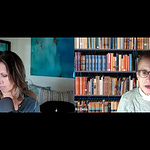My sister recently asked me if college was a scam: a swindle, a fraud. I think many colleges have followed Paulo Freir’s teaching and market themselves as places of learning but cash out as activist training centers. Freir, author of Pedagogy of the Oppressed, has led educators to teach through the lens of power structures in order to train students to flip them around in the name of social justice. But many students just want to go to school to learn (and socialize). They don’t want to be activists, let alone accruers of massive wasteful debt.
Yet that is what they appear to be doing. The total student loan debt as of Q2 2024 was $1.74 trillion. The average college tuition across the country is $38k a year, doubling what it was at the start of the 21st century. This compared to the average annual salary growing by 25% during the same two-decade period.
There’s also concerns that free speech is being censored. Harvard College – the oldest college in the US having started in 1636 - and considered one of the best has always had a mission to expose students to “new ideas, new ways of understanding, and new ways of knowing” - this of course, means welcoming diversity of thought and free speech. But in recent years, that’s changed. Harvard ranked dead last for colleges across 254 top schools when students were surveyed on their ability to engage in free speech.
Are today’s colleges just a bubble that needs to be burst? Have they become training centers for a new worldview or are they places for students to ask questions and learn skills to innovate?
At least one college is striving for the latter purpose: Miami Dade College. Here’s my interview with Madeline Pumariega, President of Miami Dade College. Miami Dade College will host “Culture, Religion & Technology, take II” on October 29 from 2:30pm-9pm ET.
Some highlights:
2:23 Highlights of Miami Dade College: MDC is Democracy’s college with 125k students. 60% of students are first to go to college; 70% have some kind of aid; under 2% take on debt to finish their degree. MDC has over 2.5 million alumni.
5:12 pm - Madeline’s religion and faith: “I tend to say my purpose/passion is grounded in my faith. We’re here to serve God’s purpose. My faith and my family are the most important. My foundation of faith and family helps me to think about purpose. I was raised Catholic and practice Catholicism. But religion is not about place, it’s not about worship in church but relationship with God.” Madeline also touches on the description of knowledge as it is defined in the Bible: the fear of the Lord is the beginning of knowledge.
11:24 - Are colleges centers of critical pedagogy? Madeline acknowledges that there are power structures and that they are flattening out as children are more vocal and determined to be engaged. While students have a right to engage their thoughts, the school needs to shepherd those discussions in a respectful process that encourages critical thinking that leads to knowledge sharing.
18:35 - MDC is known for being an open-access college, meaning all are admitted. The majority of students in the college are enrolled in a 2-yr Associates of Arts program. But there are workforce programs that teach nursing, cybersecurity, etc.
20:45 - Changing the perception that an Ivy League school is what kids should aspire to. Parents have to have conversations with their children to understand their roadmap. It shouldn’t take mortgaging a house to get access to college and not everyone can pay $200k for college. But school is still important and a must, for Madeline. That means costs should come down across the country. In Florida, public universities have not raised tuition in over 12 years. Students can take 12 credits for about $1500 a semester at MDC.
26:11 - MDC does not spend a lot on administrative staff. In the last three years, the college hired 100 faculty, with very few administrators. The school is dedicated to teaching students, and that requires a focus on faculty, and not research papers and getting published or creating bureaucracies. Administration hires have gone toward new divisions, such as The Office of Emergency Management, which is required by Florida to keep campuses safe. There’s also administrators for mental health services that MDC provides.
31:20 - About 90% of graduates land jobs in the community. MDC is known as the “workforce engine” of the community largely because MDC partners with businesses to understand what jobs are in demand and therefore what skillsets should be taught.
32:00 - Enrollment in MDC vocational schools or workforce programs is going up, which is mirroring what’s happening across the country. Today, about two-thirds of students are enrolled in Associates of Arts, so their goal is to go to a University afterward. That percent is down from 80% a few years ago.
38:30 - MDC is the Uber of college. Madline continually tries to reimagine the student experience and offer a wider array of pathways that meet the needs of students.
41:20 - MDC’s relationship with AI and ChatGPT. By partnering with the Miami Tech Coalition, MDC offers a package of courses for an AI major, such as ethics and AI; coding of AI and learning the difference between generative AI and other forms of machine learning. Madeline also encourages students and faculty to embrace ChatGPT because not doing so is akin to ignoring Encyclopedia Britannica or the internet.
47:20 - Free speech at MDC and whether its faculty mirrors colleges across the country where there are 5 liberals to 1 conservative. MDC’s faculty mirrors its community with 75% being Hispanic and around 18% African American. The school represents diversity of color and thought. The school embraces free speech but does not condone violence of encampments. The school also doesn’t offer a DEI program or gender studies. The best way to have diversity and inclusion and equity is to ensure everyone’s opinions are heard.











